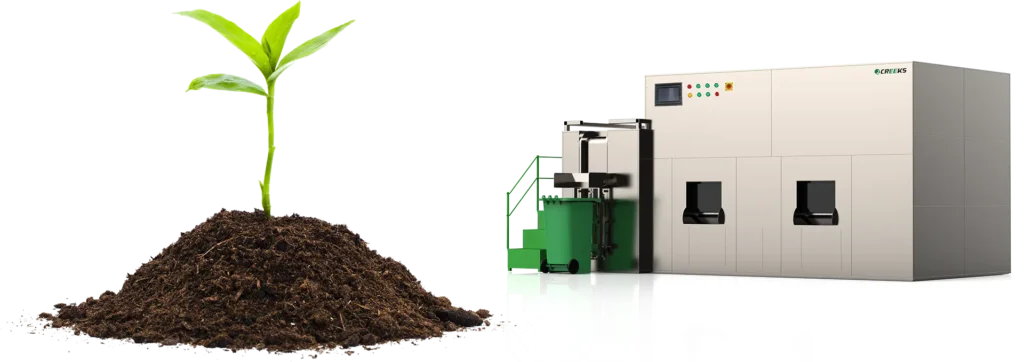
What can you Achieve Through Organics and Food Waste Recycling?
Whether you’re a small or medium-sized business, enterprise-level organization, or municipality, Creeks will work with you as a partner to enable you to efficiently process green waste, food waste, and other organics to produce high-quality mulch, compost, and soil amendment products.
Investing in advanced organics and food waste recycling equipment can significantly push profitability for businesses and municipalities by reducing waste disposal costs, creating valuable by-products, and promoting sustainability. Here’s how you can leverage this equipment to enhance profitability:
Key Strategies:
1. Implement Efficient Waste Collection Systems:
- Smart Bins and IoT Solutions: Use bins equipped with sensors to monitor waste levels and optimize collection routes, reducing transportation costs and emissions.
- Source Separation: Encourage or mandate the separation of organic waste at the source to improve the quality of input materials for recycling.
2. Adopt Advanced Processing Technologies:
- Anaerobic Digesters: Convert organic waste into biogas (a renewable energy source) and digestate (a nutrient-rich fertilizer). This can provide a dual revenue stream from energy production and fertilizer sales.
- In-Vessel Composters: Use these for rapid and controlled composting, producing high-quality compost that can be sold to agriculture or landscaping industries.
3. Develop Value-Added Products:
- Biochar Production: Through pyrolysis, convert organic waste into biochar, which can be used to improve soil health, sequester carbon, and be sold as a premium product.
- Nutrient Recovery: Extract valuable nutrients like phosphorus and nitrogen from waste streams to create commercial fertilizers.
4. Leverage Circular Economy Practices:
- Closed-Loop Systems: Integrate the recycling process into your business operations to reduce waste, reuse materials, and recycle by-products, enhancing overall efficiency and sustainability.
- Partnerships and Collaborations: Work with local farmers, energy providers, and waste management companies to create synergistic relationships that benefit all parties.
5. Optimize Operational Efficiency:
- Automation and Robotics: Use automated sorting and processing equipment to increase throughput and reduce labor costs.
- Data Analytics: Implement data analytics to monitor operations, identify inefficiencies, and optimize processes.
6. Regulatory and Compliance Benefits:
- Adherence to Regulations: Ensure compliance with local, national, and international waste management regulations, avoiding fines and enhancing your company’s reputation.
- Incentives and Grants: Take advantage of government incentives and grants for waste reduction and recycling initiatives.
Case Studies:
1. Municipal Organic Waste Management:
A city implements a comprehensive organics collection program, uses anaerobic digesters to produce biogas for municipal energy needs, and sells digestate to local farms, reducing landfill use and generating revenue.
2. Food Processing Facility:
A food processing company invests in in-vessel composters and nutrient recovery systems, turning waste into high-quality compost and commercial fertilizers, reducing disposal costs and creating new product lines.
Potential Challenges and Solutions:
- Initial Investment Costs: High upfront costs can be mitigated by phased implementation, leasing equipment, or seeking financial assistance through grants and incentives.
- Market Development: Creating a market for by-products like compost and biogas may require education and partnerships with potential buyers.
- Technology Adoption: Ensuring staff are trained and processes are optimized for new technologies can enhance the return on investment.
By strategically investing in advanced organics and food waste recycling equipment, businesses and municipalities can not only push profitability but also contribute to environmental sustainability and resource efficiency.
